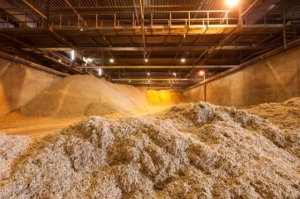


(Posted on 14/02/20)
The Port of Rotterdam saw a freight throughput of 469.4 million tonnes in 2019, fractionally higher than in 2018 (469 million tonnes). Investments by the Port of Rotterdam Authority were again at a high level, with gross investments including participations amounting to €338.3 million (2018: €408.1 million). The net result excluding taxes amounted to €241 million (2018: €254.1 million).
Dry bulk throughput decreased by 4% to 74.5 million tonnes (2018: 77.6 million tonnes). The fall in coal throughput was considerable (-14.8%). The share of coal in Dutch and German power generation has decreased significantly as both countries are generating more power from solar, wind and gas. Throughput of coking coal also came under pressure as a consequence of declining steel production in Germany. The annual iron ore and scrap throughput remained almost the same as in 2018. This is a good result considering the reduction in steel production in Germany. Biomass throughput increased by 62.8%, mainly due to the import of wood pellets for co-firing in coal-fired power plants.
The port of Rotterdam is an important port for the import of biomass into Europe. Wood pellets, the most important biomass product group, are primarily used in the European heating and energy market. Excellent connections for the supply, throughput and handling of biomass in the port, existing cargo flows and specialised transhipment and storage facilities make Rotterdam an attractive hub for biomass distribution.
Significant underlying shifts were observable between the various commodities in Rotterdam during 2019. Whereas crude oil, container, LNG and biomass throughputs increased, coal and mineral oil product throughputs decreased. Over the past year significant progress has been made with digitisation and the energy transition, in particular through the launch of PortXchange, the proposed expansion of the heat supply network, and the agreement between the Port Authority and various companies to work towards the capture, transport and storage of CO?.
Allard Castelein, the Port of Rotterdam Authority CEO said, ‘The Port of Rotterdam has matched the transhipment volume recorded in 2018. Of course, we are working hard to further increase our leading position and are investing heavily to achieve this. However, the success of a modern port cannot be measured by throughput tonnage alone. Our customers no longer just want increased throughput capacity, but demand a better, faster and, above all, smarter port. Equally crucial for the future is that industry succeeds in accelerating the energy transition so that the Port of Rotterdam can make a real impact towards achieving the Dutch climate objectives. To help make this happen we need a decisive and proactive government that works together with the business community.’
Annual throughput of other breakbulk increased by 2.9% as a result of an increase in extra cargo packages. Nevertheless, a decline in throughput was observable in the fourth quarter as a consequence of flagging German exports.
Total throughput of liquid bulk in 2019 (211.2 million tonnes) was almost the same as in 2018 (211.8 million tonnes). Following a good start in the first six months of 2019, growth in container transhipment was almost negligible during the second six months of the year. Container throughput measured in tonnes grew by 2.5%.
The Port of Rotterdam Authority recorded a turnover of €706.6 million in 2019 (2018: €707.2 million). On the income side, port dues showed a slight increase and lease returns fell slightly. The net result excluding taxes amounted to €241 million (2018: €254.1 million).Progress has again been made over the past year with the phased redesign of the energy supply system and the stimulation of circular activities in the port.
The Port of Trois-Rivières has awarded the title of the first vessel of the year to VECTIS PRIDE... Read more
The New Lock in Terneuzen has been operational since 1 August 2025 and a new phase has now begun: On... Read more
Two modern warehouses belonging to Solid Port, one of the key operators in the Inner Port, have been... Read more
With this year’s Rail Conference “Rail Freight Transport and Seaports”, a joint initiative... Read more
Asian Bulk Logistics (ABL Group) and ICG have jointly announced the successful completion of ABL&rsquo... Read more
Abu Dhabi based AD Ports Group, a leading global enabler of integrated trade, industry and logistics... Read more
The Executive Board of Hamburger Hafen und Logistik AG (HHLA) has appointed Patrick Krawutschke as Managing... Read more
Abu Dhabi based AD Ports Group, a global enabler of integrated trade, transport, industry, and logistics... Read more
This year marks a significant milestone in maritime innovation as Port Hedland, Australia, celebrates... Read more
Associated British Ports (ABP), the UK’s leading port operator, has announced the latest tranche... Read more